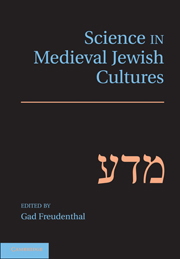Book contents
- Frontmatter
- Contents
- Contributors
- Preface and Acknowledgments
- Introduction: The History of Science in Medieval Jewish Cultures
- Part I The Greek-Arabic Scientific Tradition and Its Appropriation, Adaptation, and Development in Medieval Jewish Cultures, East and West
- Part II Individual Sciences as Studied and Practiced by Medieval Jews
- 5 Logic in Medieval Jewish Culture
- 6 Astronomy among Jews in the Middle Ages
- 7 Interactions between Jewish and Christian Astronomers in the Iberian Peninsula
- 8 The Hebrew Mathematics Culture (Twelfth–Sixteenth Centuries)
- 9 Mathematical and Physical Optics in Medieval Jewish Scientific Thought
- 10 The Evolution of the Genre of the Philosophical-Scientific Commentary
- 11 Latin Scholastic Influences on Late Medieval Hebrew Physics
- 12 Meteorology and Zoology in Medieval Hebrew Texts
- 13 The Mental Faculties and the Psychology of Sleep and Dreams
- 14 Toward a History of Hebrew Astrological Literature
- 15 Astrology in Medieval Jewish Thought (Twelfth–Fourteenth Centuries)
- 16 Astral Magic and Specific Properties (Segullot) in Medieval Jewish Thought
- 17 Medicine among Medieval Jews
- 18 Alchemy in Medieval Jewish Cultures
- 19 The Science of Language among Medieval Jews
- Part III Scientific Knowledge in Context
- Name Index*
- Subject Index*
- References
12 - Meteorology and Zoology in Medieval Hebrew Texts
from Part II - Individual Sciences as Studied and Practiced by Medieval Jews
Published online by Cambridge University Press: 05 June 2012
- Frontmatter
- Contents
- Contributors
- Preface and Acknowledgments
- Introduction: The History of Science in Medieval Jewish Cultures
- Part I The Greek-Arabic Scientific Tradition and Its Appropriation, Adaptation, and Development in Medieval Jewish Cultures, East and West
- Part II Individual Sciences as Studied and Practiced by Medieval Jews
- 5 Logic in Medieval Jewish Culture
- 6 Astronomy among Jews in the Middle Ages
- 7 Interactions between Jewish and Christian Astronomers in the Iberian Peninsula
- 8 The Hebrew Mathematics Culture (Twelfth–Sixteenth Centuries)
- 9 Mathematical and Physical Optics in Medieval Jewish Scientific Thought
- 10 The Evolution of the Genre of the Philosophical-Scientific Commentary
- 11 Latin Scholastic Influences on Late Medieval Hebrew Physics
- 12 Meteorology and Zoology in Medieval Hebrew Texts
- 13 The Mental Faculties and the Psychology of Sleep and Dreams
- 14 Toward a History of Hebrew Astrological Literature
- 15 Astrology in Medieval Jewish Thought (Twelfth–Fourteenth Centuries)
- 16 Astral Magic and Specific Properties (Segullot) in Medieval Jewish Thought
- 17 Medicine among Medieval Jews
- 18 Alchemy in Medieval Jewish Cultures
- 19 The Science of Language among Medieval Jews
- Part III Scientific Knowledge in Context
- Name Index*
- Subject Index*
- References
Summary
METEOROLOGY
During the Middle Ages, both Muslim and Jewish scholars displayed a great interest in the study of meteora, a term that covered a wide variety of phenomena, some of which we would describe today as astronomical or seismological rather than as meteorological. Their principal source was Aristotle's Meteorology, which, in the commonly accepted order of learning, was the fourth of his treatises on natural philosophy. The topics investigated by Aristotle are the stratification of the atmosphere, cloud formation, the Milky Way and comets, all forms of precipitation (rain, snow, hail, etc.), and rivers and springs (Book I); seas, winds, earthquakes, and thunder and lightning (Book II); and whirlwinds, thunderbolts, halos, rainbows, and rods (Book III). Aristotle's explanations of these phenomena are based on his theory of exhalation: The moist and the dry exhalations that are constantly drawn up from the earth by the heat of the sun generate these phenomena. The subject matter of Book IV – the effects of heat and cold on various bodies and the formation of homogeneous bodies – has little or no connection to the preceding books.
Medieval Arabic philosophers and scholars referred to this discipline as “the upper phenomena” (al-āthār al-ʿulwiyya). Their views are found in a considerable number of treatises, encyclopedic texts, and adab works. The history of the study of meteorology in the Arabic tradition was recently surveyed by Paul Lettinck. He examined the reception-history and development of Aristotle's Meteorology and its Greek commentators, starting with its translation into Arabic in the ninth century, continuing with the writings of Muslim philosophers such as al-Kindī, Ibn Sīnā and his pupils, Ibn Bājja, and Ibn Rushd, and the meteorological sections of some medieval Arabic encyclopedias.
- Type
- Chapter
- Information
- Science in Medieval Jewish Cultures , pp. 217 - 229Publisher: Cambridge University PressPrint publication year: 2012



